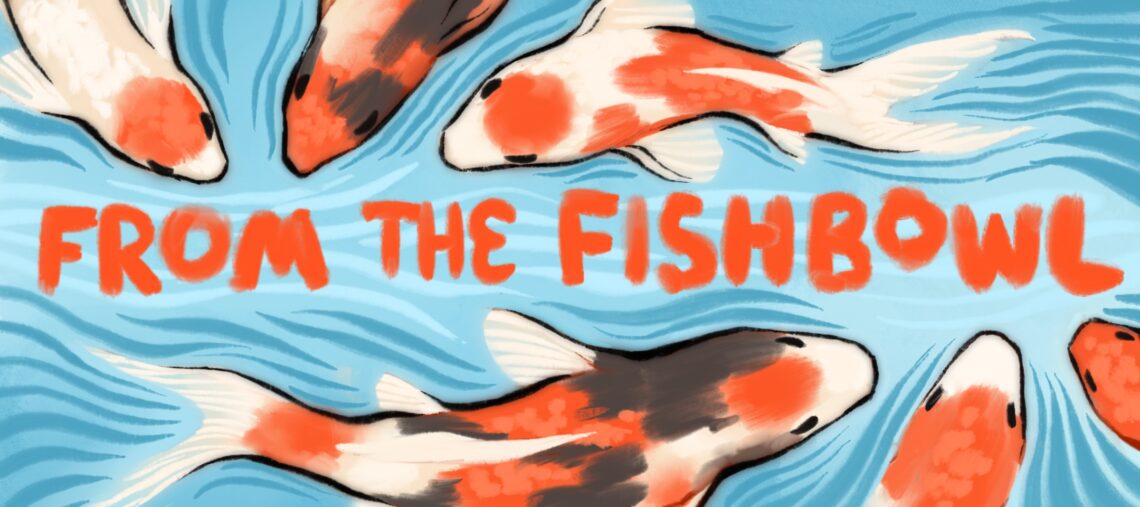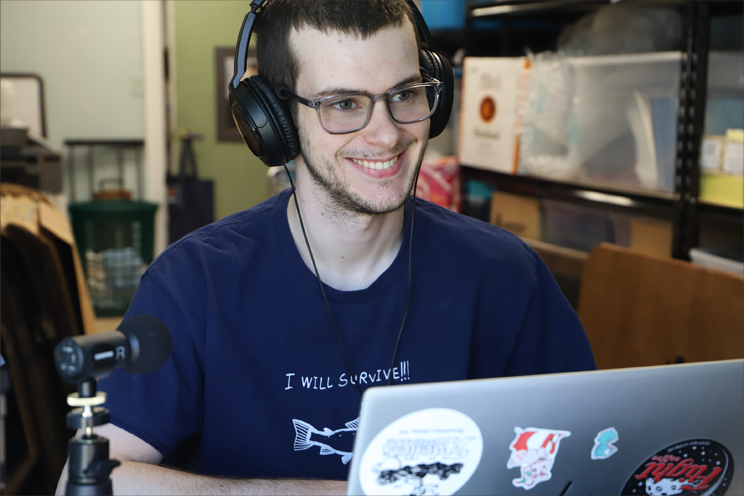
 Hello there! Whoever you are, wherever you are, and whatever you happen to be doing. I want to thank you for coming here. My name is Morgan Hinckley, I’m a senior at TNS, and this is the webpage for my senior project: From The Fishbowl.
Hello there! Whoever you are, wherever you are, and whatever you happen to be doing. I want to thank you for coming here. My name is Morgan Hinckley, I’m a senior at TNS, and this is the webpage for my senior project: From The Fishbowl.
If you don’t know what a senior project is, then allow me to explain. It’s a long-term project that a senior designs for themselves concerning something they’re passionate about, and it’s intended to be the crowning achievement of their education.
I initially struggled a lot to come up with a suitable project, especially because I couldn’t think of anything I was passionate about that fit the bill. However, after talking to a lot of people and giving it some thought, my efforts eventually coalesced around an idea: to learn more about my community, and to share what I learned through audio journalism.
That idea evolved and changed with time, but its core remained consistent and From The Fishbowl is the result. What you’ll find here is a series of interviews I conducted with members of the TNS community. My goal was to learn about their experiences and perspective as a member of our community and, through that, learn more about the community in turn. I believed at the outset that communities ARE their people, and that belief was only cemented by the experience of making this project.
In case you weren’t planning to already, I encourage you to give these interviews a listen. They each range from about half an hour to an hour long, and all contain incredible insight, which I did my best to describe below each, so take your time and choose where to start based on what interests you. Imagine that you’ve just run across a shoebox of old cassette tapes in an overcrowded closet, and decided to give them a listen out of curiosity.
I should also warn that each interview has unique and somewhat finicky audio, so please be prepared to adjust your volume while listening. I apologize for any inconveniences that result from this.
I want to thank everyone who was interviewed for this project. It would not have been possible without all of you, and the incredible job you each did in the moment. I also want to thank my senior roundtable members for supporting me throughout, my teachers for being so understanding, the people I consulted in the course of this project for their advice, and everyone who is reading this for taking the time to engage with my project! This was an incredibly enriching experience that taught me so much about so many things, and I only hope that I’ll manage to pass what I learned onto anyone who listens in!
Interviews
Christine Knowles: Education Director, Long-time Teacher
(Length: 39 Minutes)
My interview with Christine was the final interview I conducted, and I personally think it was a great capstone to this project. Its pacing, execution, and ideal length are the culmination of my efforts as an interviewer, all supported by Christine’s thoughtful and focused demeanor as the interviewee. We touched on a wide variety of topics while managing to keep a strong through-line as she shared all manner of incredible things. As a student, some of the anecdotes blew my mind, so much so that I could barely catch my breath. Learning about the core of the community and her history with the school was very enlightening, and I am so glad that I could end my time as an interviewer on such a high note.
Myriah Davis: Humanities Teacher
(Length: 64 minutes)
Out of all these interviews, this one was recorded earliest. It’s also the longest, having originally been recorded in two parts, and being edited down significantly for the sake of brevity and focus. As for why it’s so long, Myriah and I explicitly address our shared tendency to go off topic and venture down rabbit holes. However, I don’t think that’s a bad thing, and I believe this to be a great interview. Myriah did a fantastic job sharing her perspective as a teacher in detail, using her experiences to put things into context, and talking at length about the complexities of teaching and forging relationships with students in such an individualized school. It was a highly enjoyable time, and I hope that you learn as much as I did.
Amy Wentworth: Alumnus Parent, Board Member, SAU Lead Educator
(Length: 52 Minutes)
This interview is very different from the others and, though I was hesitant to include it at first, I have come to appreciate those differences. As opposed to focusing on Amy’s connection to TNS, I found myself asking her about the history of SAU (The School Around Us) and TNS. We ended up talking about the schools’ shared history, recent changes they’ve undergone, and about the educational, structural and governmental models of both schools, among a whole host of other things. Though we both struggled a bit to articulate our thoughts, Amy did a great job, encouraging and feeding into the different discussions we had. I’m very glad that I got to have such a unique conversation with Amy, and if any of the aforementioned topics interest you then I would encourage you to listen as well.
David Jones: Alumnus Parent, Board of Trustees Treasurer
(Length: 34 Minutes)
Of all those I had the chance to interview, David’s involvement with TNS has spanned the longest period, and he’s been quite involved throughout that time. He was very good at describing his experiences and giving a full picture of his perspective, whether that be as a parent, treasurer, or community member generally. His explanations and anecdotes concerning the finances were entertaining, informative, and served to put things into perspective. Above all though, hearing about the profound effect the school had on his family, that it has motivated him to continue being a part of this community despite the passage of time has confirmed to me just how remarkable the impact of TNS can be.
Tom Kittredge: Alumnus, Board of Trustees Chairperson
(Length: 27 Minutes)
The use of Zoom for this interview definitely caused me to struggle a bit, both as an interviewer and later with the technical side of things. However, Tom more than made up for it. Hearing about the profound impact the school had on him, the incredible things he was able to pursue as a student, the positive impact it had on his direction in life, and that his siblings all had great experiences was awesome. I also enjoyed learning that his experience as a board member encouraged him to participate in other boards, and how it helped to facilitate his continued involvement in the TNS community. He described all of this in a swift and neat manner, so if you’re strapped for time I would suggest giving this one a listen.
Logan Alexander: Alumnus, Board of Trustees Member
(Length: 48 Minutes)
Logan did an incredible job of eloquently articulating his experiences, encapsulating so many aspects of what it’s like to be a student at TNS, and describing the effects that his time at TNS had on his life trajectory. As a student, I connected very strongly with what he shared, and was compelled to speak about my own perspective. I was also deeply affected by how he expressed his enduring connection to TNS, so much so that I needed to pause the interview and take a minute for myself, which was fitting given some of what we discussed. I have high hopes that many people will connect with what Logan shared, and I am incredibly grateful that this interview came to pass.
Hunter Roberts: Senior Class of ’23
(Length: 32 Minutes)
Hunter was the only current student I ended up being able to interview at length. The interview was also a bit challenging, as I didn’t quite know how to act while interviewing a fellow student, winding up a bit awkward and scattered. Despite that, I’m very grateful to Hunter, because he did a great job talking about the educational and emotional growth he’s undergone at TNS, sharing many intimate and impactful experiences which changed his life for the better. Hearing him talk about those things had a big impact on me in turn, and I’m excited that people will have a chance to hear what he had to say.
Q&A:
What is the Fishbowl?
It’s the oversized, overcrowded, cramped and crusty closet which operates as my de facto office. It was once a part of the neighboring common room, having originally been walled off to serve as a quiet workspace. It gets its name from the now absent interior window which used to give outsiders a look inside. It is where I decided to conduct all of my interviews because, despite being a pain to navigate, it is quite private. I also see it as an ironic homage to my previous school, Bigfish, whose shutdown originally led me to TNS in the first place. As a former bigfisher, it’s fitting that I would end up primarily spending my time in “the fishbowl”.
Why did you interview who you did?
Because, for most of this project, I was flying by the seat of my pants. I mentioned earlier that I struggled to come up with a project idea. This meant that I had far less time to plan and work on the project, which resulted in a very intense experience where every setback was substantial. Many interviews I’d hoped to conduct never came to fruition, and a few interviews I DID work on couldn’t be released for a multitude of reasons. Despite this, I don’t think I’ve failed to represent any group within the TNS community, with one exception: current students. The fact that I didn’t get to learn from and share the perspectives of more peers is probably my biggest regret.
What did creating this project entail?
I had to create an interview setup, contact people I wanted to interview, plan out the interviews, schedule them, conduct them, take notes while listening to them, edit them, and prepare to showcase my work on this webpage. None of these tasks were impossible, and I received a ton of guidance and support. On the whole though, the project involved me learning several new skills, and doing many things I’d never done before. Getting to grips with it was no easy feat and, though it’s not perfect, I am very proud of what I was able to accomplish given the constraints and difficulty of the endeavor.
You can contact me at morgan.hinckley@tnsk.org with questions.
All opinions expressed are the speaker’s own, and do not reflect the views of The New School or its community as a whole. Any critical statements made are not intended to target anyone in a damaging or disparaging manner.